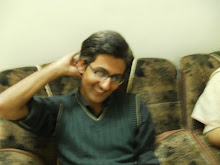It’s irritating to witness/observe people rushing after ‘HOW’ when the actual quest of existence revolves around ‘WHY’, when the Riddle to the Being is associated with ‘WHY’. WHY are we here? If we are created by some Omnipotent and Omniscient Being, WHY were we created? ‘HOW’ comes after this, and investigating HOW before WHY is a bêtise, a grave error. It’s running in vicious circles, chasing your own tail, and exhausting yourself in futile exertion!
They say, they boast, that religion/faith deciphers the enigmatic wonders at the point where reason seldom, or never, decadent to tread. Does it, in this case? The case of ‘WHY’? Lamentably, religion, no less than reason, fails, stands dumbfounded at this step. Meditation about this WHY leads to aggravation, which gives way to rejection and consequently, both faith and reason are sacrificed at the altar of nihilism. Or may be, that’s the stage where realization of Self actually beings!
A few questions from Theists:
These are very basic questions. Basic, in a sense, that without clarifying them vividly, proceeding further would be a folly and escapism of superlative degree, and unfortunately, that’s all what I find in religious scriptures, in religious books, in religious people and everything related to religion. Theists assert that human powers of reasoning and arguing fail when it comes to deciphering the intricacies of faith. But, in my opinion, religion itself does not provide any satisfactory answer to hese basic questions. Proceed then, I demand unambiguous answer from you ‘believers’!
1- Why did God create us? i.e, What is the purpose of creation?
2- If God declares those with wisdom to be the truly steadfast followers of religion, why does religion transcend human wisdom?
3- (linked with the second question) Why does, on some points, religion is above human reason and rationality? i.e, Points where religion demands ‘Imaan bil-gaib’?
4- If the destination ordained by religion can not be arrived at ONLY through human reason and intellect, why is it imposed on humans? i.e, Why does God want humans to believe in things that transcend their understanding? What’s the purpose behind this?
5- God knows all about past and future, from infinity till eternity, then why does he still want humans to go through this all and in the end, punish countless and reward some? To satisfy his vanity? Only because he was ‘hidden and unknown’ and wanted himself to be recognized?
I have discussed question 1 in a bit detail in “Initial Meditations”. Now a little discussion about question 2 and question 3 is in order: According to religion, those who are blessed with knowledge fear God more than others. In other words, they are the staunch believers and their faith is stronger as compared to common masses. But, as it happens, he more you acquire knowledge, the more your thirst and inquisitiveness increases and more you demand answers to your questing and troubling questions. However, at these certain points, religion not only itself fails to answer your questions and satisfy your quest, it forbids to indulge in such useless pursuance and warns that doing so would mislead you.
But I think to suppress the progress of human thought and hinder it’s struggle towards the search of an ultimate meaning of life further intensifies it. A repeated argument presented by the defenders of the above “suppressing theory” of religion is that there are limits to what humans can extended the limits of their knowledge and understanding. Beyond those limits, human reason and intellect cannot fathom the depths and intricacies of cognition. I personally fail to see this sort of argument going in favor of religion. They question of ‘purpose of life’, or from religious perspective, ‘purpose of creation’ is not a question that should be meant to hide from the grasp of human imagination. It’s a very basic question that haunts the mind and if religion fails to give creation a definite purpose, perhaps it does not have one in the first place, at all?
About the rest of the questions, I think I have discussed them, more or less, in “Initial Meditations”. On the way through this essay, however, if required, I would turn to these matters again.
- Initial Meditations II.
